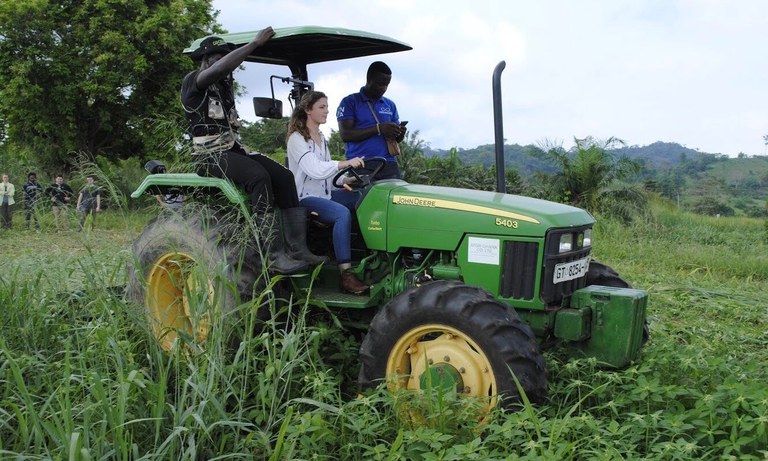Posted: June 10, 2019
Akwaaba is the Ghanian phrase for “welcome,” however its meaning is layered in African culture, symbolizing friendship and acceptance to newfound friends.
During the 2018 Thanksgiving Break, I traveled to Ghana as a member of INTAG 300, which is an introductory tropical agriculture systems course. I was initially interested in taking the course because I felt that tropical agriculture is an often overlooked aspect of the global agriculture community and that it would be a great opportunity for me to understand the importance and role which smallholder farming plays in African countries.
While the course itself did not focus specifically on Ghana or Africa, it afforded me a holistic, whole-systems view of global tropical agricultural systems and the impact that both sustainable and non-sustainable practices has on our biosphere. One particularly unique aspect of the coursework began during the first week; we were able to pick two species of plants commonly grown by smallholder farmers in tropical climates to cultivate ourselves in the Penn State greenhouses. This was probably my favorite aspect of the coursework because it truly helped to contextualize the needs of tropical plants in a fun, experiential setting.
The fun truly began when I stepped on South African Airways with five of my classmates on a lengthy flight into Accra, the capital of Ghana. When we arrived, I quickly forgot about the chilly State College air when I stepped off the plane into the dense African heat. After navigating through customs and security, we stepped into a van which would take us away from the airport and into one of the most incredible adventures of my life.
During our stay in Ghana, we were able to visit three of their most populous cities: Accra, Tamale, and Kumasi. Accra, the capital is a bustling metropolis, and is one of the most wealthy and 'westernized' cities on the African continent, however it wasn't quite the same as the Harrisburgs, Baltimores, or Pittsburghs I was used to back in the states. Tin shacks dotted the often unpaved and seemingly unplanned streets in the city, painted with vibrant designs and colors and occupied by even more beautiful, friendly, and caring people who were far from the typical curt, rude, and often unpleasant "wolf on wall street" type, typical of American urbanites. Even though the longstanding perception of Africa conjures up scenes of poverty stricken, under-educated, and malnourished people, I can truly say from the bottom of my heart that that is no longer the truth. While there will always be progress to be made, Africa is developing at an incredibly positive rate.
My classmates and I had the unique opportunity to assist one of our professors with primary data collection in several remote villages throughout the arid northern region of Ghana near Tamale. While the capital of Ghana is primarily Pentecostal, Tamale and the villages around it are predominantly Muslim. I was quite unfamiliar with Islam before I traveled to Africa, and with this new religion came a set of new cultural norms that I wasn't used to, especially for females. Even though there was a little bit of a learning curve for me, I still thoroughly enjoyed my time assisting my professor in the villages, learning more about their customs, traditions, and faith.
I am incredibly thankful for the time that I spent in Ghana. Akwaaba is the Ghanian phrase for "welcome," however its meaning is layered in African culture, symbolizing friendship and acceptance to newfound friends. The people that I met were simply incredible and extended a level of hospitality that I've never had the privilege of receiving before. I will always cherish my time in Africa and appreciate the rich heritage and culture of this incredible African nation.
Ag Sciences Global
Address
106 Agricultural Administration BuildingUniversity Park, PA 16802
- Email globalag@psu.edu
- Office 814-863-0249
- Fax 814-865-3055
Ag Sciences Global
Address
106 Agricultural Administration BuildingUniversity Park, PA 16802
- Email globalag@psu.edu
- Office 814-863-0249
- Fax 814-865-3055


